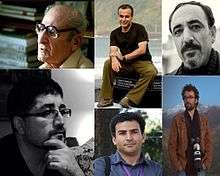Baneh
| Baneh بانه | |
|---|---|
| city | |
 Baneh | |
| Coordinates: 35°59′51″N 45°53′07″E / 35.99750°N 45.88528°ECoordinates: 35°59′51″N 45°53′07″E / 35.99750°N 45.88528°E | |
| Country |
|
| Province | Kurdistan |
| County | Baneh |
| Bakhsh | Central |
| Area | |
| • Total | 1,584.5 km2 (611.8 sq mi) |
| Elevation | 1,554 m (5,098 ft) |
| Population (2011) | |
| • Total | 90,304 |
| • Density | 57/km2 (150/sq mi) |
| Time zone | IRST (UTC+3:30) |
| • Summer (DST) | IRDT (UTC+4:30) |
| Area code(s) | 087-342 |
Baneh (Persian: بانه; Kurdish: بانه, Bane; also Romanized as Bāneh)[1] is a city and capital of Baneh County, Kurdistan Province, in Iran's western border. Baneh is neighbour saqqez, marivan, sardasht and Iraqi Kurdistan. According to the 2011 census, the city has a population of 90, 304 after the cities of Sanandaj, Marivan, Saqqez is the fourth largest city in Kurdistan province and 109th in Iran.[2] Baneh is one of the sites that still have their unique forests. Baneh is one of the greatest trading hubs in Iran where there are many shopping center and trading complex. Many passengers annually travels to the city to purchase materials and to see its untouched nature.
Appellation
Baneh name from the Kurdish word "Ban ( Kurdish:بان )" meaning "roof" long and by the height and know how to deploy and position of Baneh. 1554 meters of height above sea level and the heights of the surrounding landscape is made possible to reach people in a large way to the uphill travel.
History
Before Islam
Pre-Islamic Zoroastrian nation called "Qaqo (Kurdish:قهقو)" ruled on the region and in the Arab invasion and then took it to Ekhtiyaredinis (Persian: اختیارالدینی) Until the middle of the thirteenth century AD. the original name of the city of Baneh is Barozha (Kurdish: بهروژه)(mean:sunflower) and There are also documents that in all of them the base of Baneh, is the village was called Barozha.
Safavid
Around the time of the Safavid usually guarding the Iranian border, from the city of Kermanshah to Khoy was assigned to rulers of Baneh. Governors of Baneh and Uraman holds the title of "King". Some authors believe that this title was given to them by Nader Shah Afshar.
world war I
The city once before World War I and again in World War II was a burnt fiercely. The northeast cemetery of the city, is called "Baneh kon(Kurdish:بانه کۆڹ; Persian:بانه کهنه)". The rename and displacement reason of the city was due to cholera and plague epidemic diseases that were common every few years and then survivors, assumed the primary site infected and created the city somewhere else. Fires and tribal conflict was another cause of the displacement of city.
Contemporary
In 1323 solar Baneh was set on fire by Mohammad Rashid Khan Darokhani (of Kurds in the Iraqi village Darokhan) who had rebelled against the central government in Iran, but he escaped to Iraq by attacking government forces and the reconstruction of city began and continued for 10 years.
People
language
Sulaymaniyah Sorani Kurdish dialect is the language of Baneh.
Religion
Baneh is Sunni Muslim and their religion is Imam Shafi'i. There was a Jewish minority in Baneh, whose number was over forty families. After Israel declared independence in 1948 and the partition of Palestine, they thinking about immigration to Palestine in 1327 solar and in late 1328 immigrated and left completely Baneh. At the same time , Sardasht, Saqqez, Bokan and Marivan Jews and part of Sanandaj and Mahabad and Piranshahr Jews also emigrated. There are two theories about Jewish settlement in the West, the first one stated that the first Baneh Jewish settlement happened in the year 136 AD during the Barkoshbas (Persian: بارکوشباس) revolt against Roman government and the dispersal of Jews around the world , and second, relates this issue to Tiglate Placer king of Assyria in 741 to 749 BC, after the conquest of Jerusalem by the Placer over than sixty thousand Jews exiled in parts of the West of Iran, Median land, south of the Caspian Sea and the Caucasus Mountains.

Celebrities
- Ebrahim Younesi, translator, writer and researcher
- Bahman Ghobadi, director and writer
- Ata Nahai, writer
- Farrokh Nematpoor, novelist and translator
- Taha Karimi, director and writer
- Ebrahim alipoor, photographer
- Roya Toloui, journalist, human rights activist and feminist
Gallery
-

Arbaba Forrests
-

Baneh's Sooren Plain And Forrests
-

Baneh In Spring
-

Baneh in Evening
-

Emam Square_Baneh_Night
-

Baneh Trade Area
-

Baneh's Behesht Shopping Center
-

Laleh 4 Star Hotel_Baneh
-

Baneh_Rainy Day Dusk
-

Snow Coverd Kali Khan

language
People of Baneh mainly speak Sorani dialect of Kurdish Language. There is also a few citizens in government offices which speak Persian.
References
- ↑ Baneh can be found at GEOnet Names Server, at this link, by opening the Advanced Search box, entering "-3055216" in the "Unique Feature Id" form, and clicking on "Search Database".
- ↑ "Census of the Islamic Republic of Iran, 1385 (2006)". Islamic Republic of Iran. Archived from the original (Excel) on 2011-11-11.
| Wikimedia Commons has media related to Baneh. |
